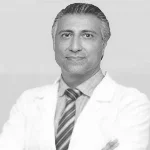
Dr. Omid Modiramani is a highly experienced medical oncologist and clinical hematologist in Dubai with more than 12 years of […]
Oral cancer is a type of cancer that develops in the tissues of the mouth or throat. It can affect the lips, tongue, cheeks, gums, floor of the mouth, roof of the mouth, and the pharynx (throat). Like other cancers, oral cancer occurs when abnormal cells grow uncontrollably, leading to the formation of tumors. It is a relatively common form of cancer, particularly among those who use tobacco or consume alcohol heavily. Other risk factors include prolonged exposure to the sun (for lip cancer), the human papillomavirus (HPV), and poor oral hygiene.
Symptoms of oral cancer often include persistent mouth sores, lumps, or rough patches in the mouth, difficulty chewing or swallowing, numbness, unexplained bleeding, or a change in voice.
Early detection is crucial because oral cancer can spread to other parts of the body if left untreated. Dentists and healthcare professionals can often identify early signs of oral cancer during routine checkups, which underscores the importance of regular dental visits.
Treatment for oral cancer depends on the stage of the disease and may involve surgery, radiation therapy, chemotherapy, or a combination of these treatments. Early-stage oral cancer is often treated more successfully, with higher survival rates. Preventive measures, such as avoiding tobacco, limiting alcohol consumption, and practicing good oral hygiene, can reduce the risk of developing oral cancer.

Dr. Omid Modiramani is a highly experienced medical oncologist and clinical hematologist in Dubai with more than 12 years of […]

Dr. Helaleh Khoshbakht is a highly respected radiation oncologist in Tehran with extensive expertise in treating various cancers, including breast, […]

Dr. Masoumeh Saberian is a highly skilled hematologist and medical oncologist based in Tehran, specializing in the diagnosis and treatment […]